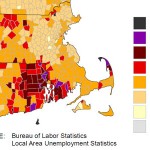Things We Read Today (22), Tuesday
The Range of Economic Development Options: From All-Government to Government-Dominated
So, the Rhode Island Public Expenditures Council (RIPEC) got more than a few column inches of coverage for its “rearrange government” recommendation for changing economic development in Rhode Island. Now a pre-fledgling group led by Gary Sasse has had its turn before the General Assembly’s Joint Committee on Economic Development, with a suggestion that might be termed a public-private-by-way-of-academics plan:
…the plans differ, with the Sasse team seeking much more of an emphasis on public-private partnerships, with a university-led research team that would develop analyses-before decisions are made about how to spend limited resources.
The RIPEC report focuses more on pulling together researchers who work in different state departments and who would collaborate under the supervision of a commerce secretary.
Sasse & Co. have been floating this idea for a number of weeks, now. I reviewed the related op-ed in early September, and at the RI Foundation’s Make It Happen RI session, I was at a table at which Sasse and Bryant University President Ronald Machtley were pitching this academy-led collaborative — which they suggested the state government could get rolling with (oh, off the top of their heads) something like a half-million-dollar grant.
The option that doesn’t seem to have gotten an airing, either in the General Assembly or the local media, is the one emphasized by the RI Center for Freedom & Prosperity’s “Prosperity Agenda.” The policies suggested at that link are intended as a starting place for public debate, but nothing will happen in this state until we get over the hump of admitting the obvious: The economy needs the state to get out of the way. That’s the big idea. That’s the organizing principle.
By “the state,” I mean economic development agencies and czars, and I mean technocratic groups of academics promising to unite the private sector under their vision. Rhode Islanders have their own visions, and they will work most diligently toward the future that helps them achieve their own, individual dreams. Everything else is just interested insiders angling for a space at the trough.
The Weird Overlaps of Ideology (Cold-Hearted Lover)
The urge to take the reins of something as organic as an economy, to insist on processes and relevant metrics, and to implement a plan for the broader society intersects interestingly with people’s political personalities. I’m thinking of this article, by Matt Ridley, in the Wall Street Journal. Ridley reports a research finding that should surprise nobody who’s ever spent much time arguing with libertarians:
… when libertarians reacted to moral dilemmas and in other tests, they displayed less emotion, less empathy and less disgust than either conservatives or liberals. They appeared to use “cold” calculation to reach utilitarian conclusions about whether (for instance) to save lives by sacrificing fewer lives. They reached correct, rather than intuitive, answers to math and logic problems, and they enjoyed “effortful and thoughtful cognitive tasks” more than others do.
Frankly, I think much of the rest of the article — placing libertarians alongside the more empathetic liberals and conservatives — makes the wrong comparisons. Break-a-few-eggs technocrats (the central planners implied above in both the RIPEC and Sasse proposals) are probably as apt to make “cold, calculating” decisions as libertarians (to quote from Ridley’s title). One gang just thinks government is the appropriate agent for ordering society, while the other thinks the individual is.
In the modern political field, I’d suggest that there are really two axes: one ranges from individual to government, while the other ranges from self to community.
New England Conservatives’ Letter in a Bottle
Michael Graham’s musings about the Scott Brown v. Elizabeth Warren Senate race across the border in Massachusetts will surely inspire nodding heads among Rhode Island conservatives and Republicans (memo to Projo: those are different groups):
People outside Massachusetts tend to forget just how partisan this state is. Until Scott Brown’s special-election win in 2010, there hadn’t been a Republican at the federal level in Massachusetts since 1996.
In 2010, as the tea-party-powered GOP tide swept the U.S., not a single statewide Democrat lost an election — not even the Democrat running for auditor who had been caught cheating on her taxes weeks before the election.
These facts fly in the face of the myth treasured by the Massachusetts political media that Bay State voters “are actually very independent.” … Do Massachusetts Democrats really want “good-government bipartisanship?” Or would they rather just elect a fellow Democrat and call it a day?
Not surprisingly, Graham’s strategy analysis will sound very familiar to Ocean State ears, as well.
It’s getting increasingly difficult, around here, not to call “baloney” when people tending toward our local incumbents say that they vote the candidate, not the party, or that their views are really just moderate. The Southern New England electorate is like a society of nocturnal critters testing their will against the rising sun. Any flicker of doubt or awkwardness can be enough to send them back to the cover of the narrative that they’ve inherited.
Speaking of the Inherited Narrative
This one is just too perfect not to note. As part of its pro-Obama campaign, the AFSCME labor union persuaded a garbage man who works Mitt Romney’s neighborhood to go on tape and say (emphasis added):
My name is Richard Hayes, and I pick up Mitt Romney’s trash. We’re kind of like the invisible people. He doesn’t realize that the service we provide – if it wasn’t for us, it would be a big health issue, us not picking up trash.
It’s almost as if some GOP double agent inside the organization was quoting directly from Romney’s 2010 book, No Apology: The Case for American Greatness. Therein, Romney writes about his campaign project of spending a day every few weeks doing the jobs of the people whom he’d represent, while running for governor of Massachusetts. While working as a garbage man, Romney says:
I stood on that little platform at the back of the truck, holding on as the driver navigated his way through the narrow streets of Boston. As we pulled up to traffic lights, I noticed that the shoppers and businesspeople who were standing only a few feet from me didn’t even see me. It was as if I was invisible. Perhaps it was because a lot of us don’t think garbage men are worthy of notice; I disagree – anyone who works that hard deserves our respect.
Don’t expect to see much made of that interesting parallel anywhere outside of the conservative and Republican media (memo to Projo: those are different groups).
The Media Coup d’État
I think Roger Simon conflates the multiple fronts of the cultural movement currently effectuating a subversive takeover of the United States when he terms it a “media coup d’état.” Still, those who truly believe in the non-ideological importance of a free, trustworthy media should take seriously the fact that a great many Americans see more than a little truth in this:
It is the media that rules us then, not politicians. Politicians come and go; journalists, pundits, commentators – in print, on television, and now on the Internet – last forever, or nearly, as they pass the baton to the next generation without a semblance of an ideological blip, seamless as a gold medal track team.
They are the ones who tell our story to us. They are our mirrors and they are indeed a new class, as resistant to change as any entrenched group of the rich and powerful. (Yes, many of them are not so rich and powerful nowadays, but the ones that count, the ones that truly rule, are. And the others stand patiently by, waiting for their turn.)




